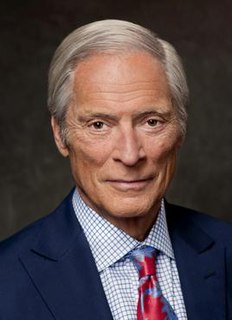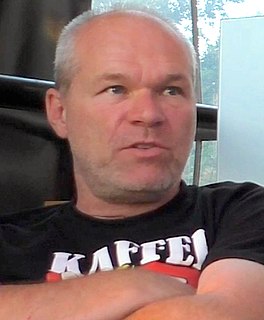Top 198 Subsidies Quotes & Sayings - Page 4
Explore popular Subsidies quotes.
Last updated on April 21, 2025.
Net result [of the Dept. of Agriculture's Payment in Kind - PIK - program]: total farm income, now expected to be around $25 billion, this fiscal year, will exceed total federal subsidies by only a couple of billion. You could argue that those fellows out there on the fruited plain are in effect working for the federal government and that, therefore, the U.S. now has socialized agriculture under the Reagan Administration. Rich, eh?
Legal plunder can be committed in an infinite number of ways; hence, there are an infinite number of plans for organizing it: tariffs, protection, bonuses, subsidies, incentives, the progressive income tax, free education, the right to employment, the right to profit, the right to wages, the right to relief, the right to the tools of production, interest free credit, etc., etc. And it the aggregate of all these plans, in respect to what they have in common, legal plunder, that goes under the name of socialism.
Few tears will be shed over the demise of the East German army, but what about East Germany’s eighty symphony orchestras, bound to lose some subsidies? Or the whole East German system, which covered everyone in a security blanket from day care to health care, from housing to education? Some people are beginning to express, if ever so slightly, nostalgia for that Berlin Wall.
You don't need any courage today in Germany to make a movie about the Nazi time. You get all the subsidies, you get the TV stations, you get the good reviews. But you need courage to kick in the balls all the people that are still hiding under the blanket, and to say, "Oh, Adolf Hitler was maybe not so bad." And with my little Nazi jokes in Postal, I offended the Germans in a harsh time.
Deregulation is a popular term that's used across the political spectrum. And it's one of these terms like "choice," that corporate interests have used because they know their focus-group buzzword testing makes it sound like a popular word. Because, who can be against deregulation? Being free, having liberty, not having someone tell you what to do, being deregulated, hey, that sounds great. But deregulation is a non sequitur in the realm of media policy or media regulation. The issue is never regulation versus deregulation; our entire system is built on media policies and subsidies.
While Donald Trump was busy with his accountants trying to figure out how to keep living like a billionaire, and all the while he was using his political connections to collect hundreds of millions of dollars in government subsidies and extra tax breaks for his companies. In other words, Trump was taking from America with both hands, and leaving the rest of us with the bill.
Even if someone wanted a purely free-market, competitive media system, it would require extensive government regulation to set up those markets. All our largest media companies are based on the grant of explicit government monopoly privileges and licenses, or franchises, or subsidies. The government didn't come in after the system was in place, it built the system in the first place.
Every candidate running for president has got to answer the following very simple question: At a time when we need to address the planetary crisis of climate change, and transform our energy system away from fossil fuels and into energy efficiency and sustainability, should we continue to give $135 billion in tax breaks and subsidies over the next decade to fossil fuel companies?
In different countries the basis of resistance takes different forms, but it comes chiefly from the conservative groups. Hence it becomes increasingly difficult to go on spending in the presence of persisting deficits and rising debt. Some form of spending must be found that will command the support of the conservative groups. Political leaders, embarrassed by their subsidies to the poor, soon learned that one of the easiest ways to spend money is on military establishments and armaments, because it commands the support of the groups most opposed to spending.
Most companies want free enterprise in general because that produces better goods and services and makes people's lives better, but they don't want it in their business. They want protection from competition, they want subsidies, they want the government to pick winners and losers, and they want to be picked as winners, and that's what we're opposing, and that's what drives my whole efforts in policy, and in the political arena.
While big business gain subsidies and political access, small businesses drown in red tape, and individuals now risk being classified as terrorists for complaining about it. Economic globalisation is about homogenising differences in the worlds' markets, cultures, tastes and traditions. It's about giving big business access to a global market.
Obamacare's not imploding. The main goal of Obamacare was two-fold. One was to cover the uninsured, of which we've covered 20 million, the largest expansion in American history. The other was to fix broken insurance markets where insurers could deny people insurance just because they were sick or they had been sick. Those have been fixed, and for the vast majority of Americans, costs in those markets have come down, thanks to the subsidies made available under Obamacare.
Poland does not want to remain a net recipient of EU subsidies forever. On the contrary: we want the right to develop in a fair market, and by this right, we want to one day catch up with Germany in terms of welfare and economic power. This will not take 100 years! And then many Poles who emigrated will be able to return home.
The ninety-nine cent price of a fast-food hamburger simply doesn't take account of that meal's true cost--to soil, oil, public health, the public purse, etc., costs which are never charged directly to the consumer but, indirectly and invisibly, to the taxpayer (in the form of subsidies), the health care system (in the form of food-borne illnesses and obesity), and the environment (in the form of pollution), not to mention the welfare of the workers in the feedlot and the slaughterhouse and the welfare of the animals themselves.
There's opposition in Europe to Turkish membership because these are the inevitable fears of energetic, poorer, Muslim outsiders who will come in and work hard and take jobs. There's also a fear that under E.U. rules Turkey might get a disproportionate amount of cohesion funds and agricultural subsidies - although it's quite clear that Europe is changing its rules, and that there will not be very much in the way of net transfers of resources from Europe to Turkey.
Higher education isn't just a personal investment. It's a public good that pays off in a more competitive workforce and better-informed and engaged citizens. Every year, we spend nearly $100 billion on corporate welfare, and more than $500 billion on defense spending. Surely ensuring the next generation can compete in the global economy is at least as important as subsidies for big business and military adventures around the globe. In fact, I think we can and must go further - not just making public higher education tuition-free, but reinventing education in America as we know it.
Kelso's proposals do promise to free us from our morbid dependency on economic health through armament manufacture; they promise a way out of the welfare mess, out of foodstamps and ship subsidies, out of perpetual inflation, and they suggest a means of doing these things without being too disruptive of the wealth of five percent of the population who own the rest of us.
















